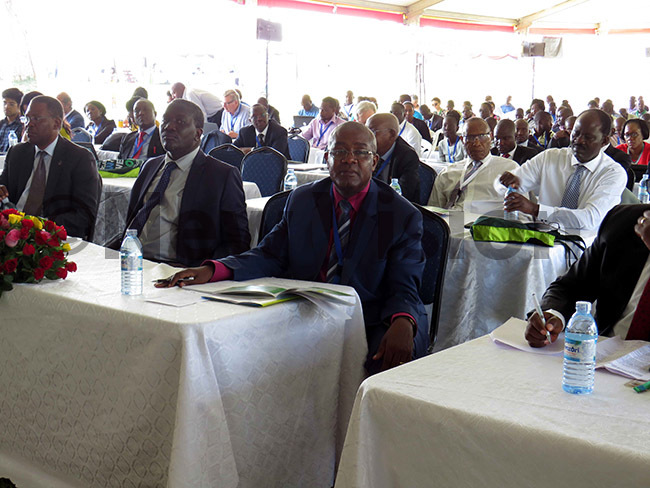Financing WASH will increase GDP by 9% - Experts
Mar 23, 2019
“We did a study on the economic contribution of water development and environmental services to the economy and the results showed that the GDP will grow by 9% if sh6-7trillion is invested into the sector.''

WATER WEEK
ENTEBBE - Water and Environment experts predict that if government injects about sh6-7trillion into the water, Sanitation and Hygiene sector, the country's Gross Domestic Product (GDP) will increase by 9%.
This was part of the suggestions made by Civil Society Organizations under their umbrella body Civil Society Budget Advocacy Group (CSBAG) during a high level policy dialogue on financing WASH in Uganda.
 Some of the members that turned up for the dialogue. Photo by Agnes Nantambi
Some of the members that turned up for the dialogue. Photo by Agnes Nantambi
The dialogue which was a side event of the Water and Environment Week at Entebbe water resources Institute was held under the theme: Financing for Water, Sanitation and Hygiene in Uganda, the challenge and opportunities.
"We did a study on the economic contribution of water development and environmental services to the economy and the results showed that the GDP will grow by 9% if sh6-7trillion is invested into the sector.
If you invest in Water and sanitation, the returns are quite enormous which academicians and the technocrats are able to calculate. "explained Collins Amanya, the principal economist in the Ministry of Water and Environment.
Amanya further explained that issues like rural urban migration are some of the things which can be analyzed and measured as they drastically end after enormous improvement.
Amanya cited an example of Mukono city which was transformed due to the investment in the supply of water and other utilities.
"Previously, Mukono had a challenge of water, but now it has turned into another upcoming city with speedy growth due to availability of water and other infrastructures.' he said.
He further noted that even if the total of 6 to 7 trillion shillings may not be fully allocated, the little added contribute to the country'a economic transformation to some extent.
He explained that the country's GDP stands at USD684 and if it is to grow by 9% annually, it will be adding USD61 to the economy given the growth rate which has been at 1.24 and 2.4 annually.
Amanya proposed that if WASH can be turned into a program and gets its independent support to address issues of sanitation and safe water coverage in local government and other communities, it would address the challenge.
"We no longer need to see people carrying water on the head if we are to achieve middle income status by 2040, because we have targets which must be achieved, but how do we achieve this when women are still carrying water on their heads? Amanya said.
Mitchell Ainebyona the program assistant at CSBAG observed that financing alternatives are very crucial in the realization of improvement in the WASH sector.
"Government has been making efforts to increase support for WASH with emphasis on schools and health facilities.
We have been trying to get other alternatives and commitments from governments to see what it can push forward what can be achieved after realizing the importance of WASH. Mitchell said.
The secretary of the Participatory Budget Club Leonton Kamya re- echoed that government has not taken the mantle to differentiate the funds meant for different issues.
"We want the money meant for WASH to be ring fenced in schools, health centers and other institutions such that it is not diverted but it is addressing the intended goals.' he asserted.
